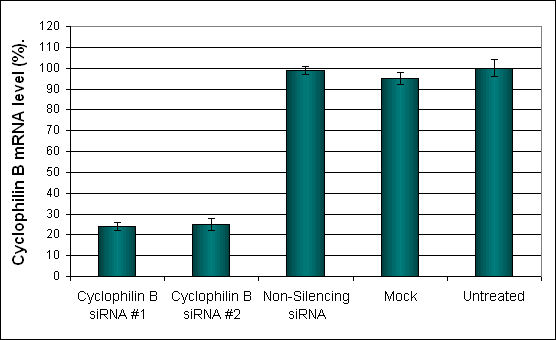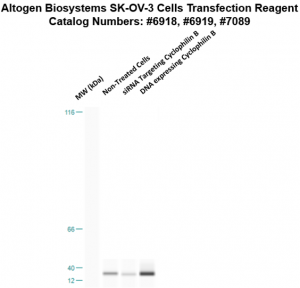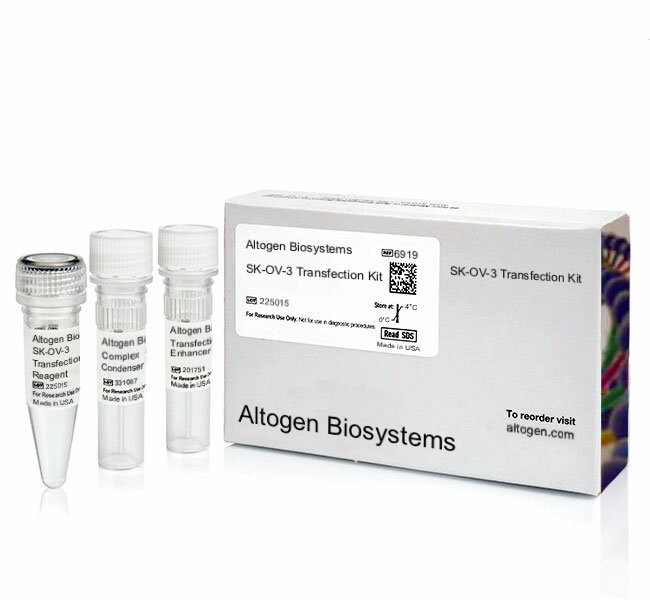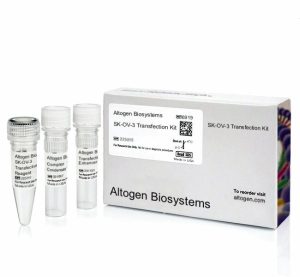Description
Purchase Orders: Click “Add to Cart” button to order, then email PO to orders@altogen.com.
Product Availability: In Stock.
Transfection Reagent for SK-OV-3 Cells (Human Ovarian Carcinoma Cells, HTB-77)
-
Two component formulation enhances lipid mediated transfection efficiency
-
Optimized easy-to-use transfection protocol provided for transfection of siRNA, DNA, mRNA, and microRNA
-
Kit includes Transfection Enhancer reagent and recommended transfection protocol
-
High transfection efficacy in the presence of serum
-
Expand your RNAi application with a reagent optimized for delivery of both siRNA and plasmid
-
Works well for standard reverse transfection and high-throughput applications
-
Download in vitro SK-OV-3 transfection protocol: [PDF]
- Download SKOV3 CRISPR/Cas9 transfection protocol: [PDF]
-
Download PowerPoint presentation for SKOV3 cells transfection kit: [PPT]
-
Developed and manufactured by Altogen Biosystems
Transfection Efficiency:
Reagent exhibits at least 74% transfection efficiency of siRNA delivery. Transfection efficiency was determined by RT-PCR
Product Description:
This transfection kit is specially designed for the SKOV3 cell line, a human ovarian cancer cells. Ensures high efficiency in delivering both DNA and RNA into SKOV3 cells.
Transfection Protocol and SDS:
Download Altogen Biosystems SK-OV-3 Transfection Protocol: [PDF]
Download SDS: [PDF]
SK-OV-3 Cell Line:
SKOV3 is a human ovarian cancer cell line that is commonly used in research to study ovarian cancer, a type of cancer that affects the ovaries. The SKOV3 cell line was originally derived from the ascites fluid of a patient with ovarian adenocarcinoma. SKOV-3 cells are known to exhibit many of the characteristics of ovarian cancer, including abnormal cell growth and differentiation, resistance to apoptosis (programmed cell death), and the ability to invade surrounding tissue. They are often used as a model system to study the mechanisms underlying ovarian cancer development and to test potential therapeutic agents for their ability to inhibit cancer growth and metastasis. Ovarian cancer is considered the fifth primary cause of cancer deaths among women, accounting for more fatalities than any other type of cancer in females. Ovarian cancer mostly occurs in older Caucasian women over 60 years old and is one of the deadliest gynecological malignancy worldwide, as indicated by the American Cancer Society. Although ovarian cancer incidence rates have been consistently declining over the last decade, new treatment approaches are required to improve survival rates of those affected. The SK-OV-3 tumorigenic epithelial cell line was isolated in 1973 from the ovarian tissue of a 64-year-old Caucasian female with adenocarcinoma. SK-OV-3 cells have been known to be resistant to tumor necrosis, as well as several other cytotoxic drugs such as Adriamycin, cis-platinum, and diphtheria toxin. The SK-OV-3 cell line is hypodiploid and a suitable transfection host for ovarian cancer research. Altogen Biosystems offers optimized lipid-based transfection kits for SK-OV-3 cells.
Cell line mutations:
| APC | 324 | 37 | 5 | 112174096 | 112174096 | Silent | SNP | C | T |
| FBXW7 | 55294 | 37 | 4 | 153247288 | 153247288 | Missense_Mutation | SNP | C | A |
| FAM220A | 84792 | 37 | 7 | 6370157 | 6370157 | Missense_Mutation | SNP | C | T |
| CHIA | 27159 | 37 | 1 | 111862928 | 111862928 | Missense_Mutation | SNP | C | T |
| PUS10 | 150962 | 37 | 2 | 61235971 | 61235971 | Missense_Mutation | SNP | C | A |
| CD8B | 926 | 37 | 2 | 87042814 | 87042814 | Missense_Mutation | SNP | G | T |
| NUP54 | 53371 | 37 | 4 | 77057381 | 77057381 | Silent | SNP | C | T |
| FAT3 | 120114 | 37 | 11 | 92087945 | 92087945 | Silent | SNP | C | T |
| KRT33B | 3884 | 37 | 17 | 39521771 | 39521771 | Missense_Mutation | SNP | C | T |
| PPHLN1 | 51535 | 37 | 12 | 42778750 | 42778750 | Missense_Mutation | SNP | C | T |
| MEGF6 | 1953 | 37 | 1 | 3511924 | 3511924 | Silent | SNP | G | A |
Data:

Figure 1. Cyclophilin B silencing efficiency was determined by RT-PCR in the SKOV3 cells transfected by Cyclophilin B siRNA or non-silencing siRNA control following the recommended transfection protocol. Cyclophilin mRNA expression levels were measured 48 hours post-transfection. 18S rRNA levels were used to normalize the Cyclophilin B data. Values are normalized to untreated sample. Data are presented as means ± SD (n=6).

Figure 2. Protein expression of Cyclophilin B in SK-OV-3 cells. DNA plasmid expressing Cyclophilin B or siRNA targeting Cyclophilin B were transfected into SK-OV-3 cells following Altogen Biosystems transfection protocol. At 72 hours post-transfection the cells were analyzed by Western Blot for protein expression levels (normalized by total protein, 10 µg of total protein loaded per each well). Untreated cells used as a negative control.
Selected in vivo transfection product citations (ALTOGEN® IN VIVO Transfection Kits used in the following publications):
- 2008 454(7203):523-7. Innate immunity induced by composition-dependent RIG-I …Saito et al [PDF]
- Am J Pathology. 2010 177(4):1870-80. Role of ocular complement factor H in a murine model … Lyzogubov et al [PDF]
- Nature Biotechnology. 2011 29(4):341-5. Delivery of siRNA to the mouse brain by … Alvarez-Erviti et al [PDF]
- Cancer Research. 2011 71(15):5144-53. Inhibition of miR-193a expression by… Iliopoulos et al [PDF]
- 2010 16(11):2108-19. RNase L releases a small RNA from HCV RNA that refolds … Malathi et al [PDF]
- 2012 55(7):2069-79. The p47phox- and NADPH oxidase organiser 1 … Youn et al [PDF]
- British Journal of Cancer. 2012 107(3):516-26. TIGAR induces p53-mediated cell-cycle … Madan et al [PDF]
Altogen Biosystems transfection and electroporation products for life sciences and cancer research. Company developed two types of in vivo delivery kits for animal research: Tissue-targeted reagents (delivery to liver, pancreas, and kidney tissues), and broad range in vivo delivery reagents (PEG-Liposome, Nanoparticle-based, Lipid-based, and Polymer-based kits). Advanced formulation of reagents and optimized transfection protocols provide efficient cellular delivery of proteins, DNA, mRNA, shRNA, siRNA, and other negatively charged molecules in vitro and in vivo. Read more about transfection technology at Altogen’s Transfection Resource. Altogen Labs provides GLP contract research studies for pre-clinical research, IND applications, and drug development. Biology CRO services include: over 90 in-house validated xenograft models, development of stable cell lines, ELISA assay development, cell-based and tissue targeted RNAi studies, safety pharmacology/toxicology assays, and other studies (visit AltogenLabs.com).
Volume Options:
- 0.5 ml (Catalog #6918)
- 1.5 ml (Catalog #6919)
- 1.5 ml CRISPR (Catalog #2197)
- 8.0 ml (Catalog #7089)
Purchase Orders: Click “Add to Cart” button to order, then email PO to orders@altogen.com.
Product Availability: In Stock.






